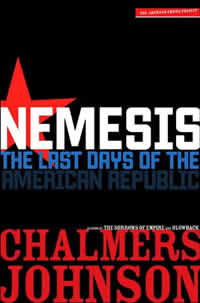Book Notes
 Chalmers Johnson, Nemesis; The Last Days of the American Republic (New York: Metropolitan Books, 2006), 354pp.
Chalmers Johnson, Nemesis; The Last Days of the American Republic (New York: Metropolitan Books, 2006), 354pp.
In this third volume of his "inadvertent trilogy" about the costs and consequences of American empire, Chalmers Johnson predicts our nation's appointment with Nemesis, "the goddess of retribution and vengeance, the punisher of pride and hubris." In Greek, "nemesis" means "to give what is due." Mind you, Johnson has a record of political prophecy.
In Blowback (2000), published eighteen months before the 9/11 attacks and largely ignored at the time, he warned that our global militarism and predatory economic policies virtually assured retaliations for decades to come. Today his warning reads like a diagnosis. In The Sorrows of Empire (2004), he detailed the breadth and depth of American militarism. Unlike ancient empires, our imperial hegemony consists not of conquered territories but of military bases. Today the Department of Defense admits that America deploys 254,788 military personnel (double that number if you include dependents) to at least 725 military bases in 153 countries (there are 189 countries in the United Nations). That does not include numerous secret and officially nonexistent bases, or the tens of thousand of private contractors that do the bidding of the Department of Defense for enormous profits. Our own country is home to 969 separate bases in all fifty states.
Nemesis conducts the autopsy. America's fate, he says, is "probably by now unavoidable." Starting with the end of the Spanish-American war in 1898, and then accelerating rapidly after the fall of the Berlin Wall in 1989, what we have witnessed here in America, says Johnson, is the breakdown of constitutional government. The main culprit is militaristic imperialism. His longer litany of causes is not new, but neither are they less corrosive—the CIA as the president's "private army" that is accountable to no one, the institutionalization of corruption in the legislature, a feckless judiciary, endemic secrecy that renders it impossible to know what parts of the government are doing, renditions to a far-flung network of prisons (eg, "Human Rights Watch has identified at least twenty-four secret detention and interrogation centers worldwide operated by the CIA."), the legalization of torture, domestic spying, flagrant disregard for international treaties, the militarization of space, staggering national debt owed to foreign creditors, and exaggerated claims of executive privilege. Johnson's tone is strident, his arguments polemical. Although he believes the Bush administration is the most egregious example of the problems he details, he is not partisan in the narrow sense; the constitutional crisis is far worse than any single administration.
In an especially instructive chapter Johnson compares the "imperial pathologies" of Rome and Britain, arguing that militarism and imperialism are necessarily enemies of democracy. As "archetypes" of empires that tried to have their cake and eat it too, Rome and Britain tried to foster democracy at home and imperialism around the globe. America now faces a stark choice between the two models. Like Britain, we can forfeit empire and retain democracy, or like Rome we can hold on to empire and lose our democracy. "The likelihood," he believes, "is that the United States will maintain a facade of constitutional government and drift along until financial bankruptcy overtakes it."


